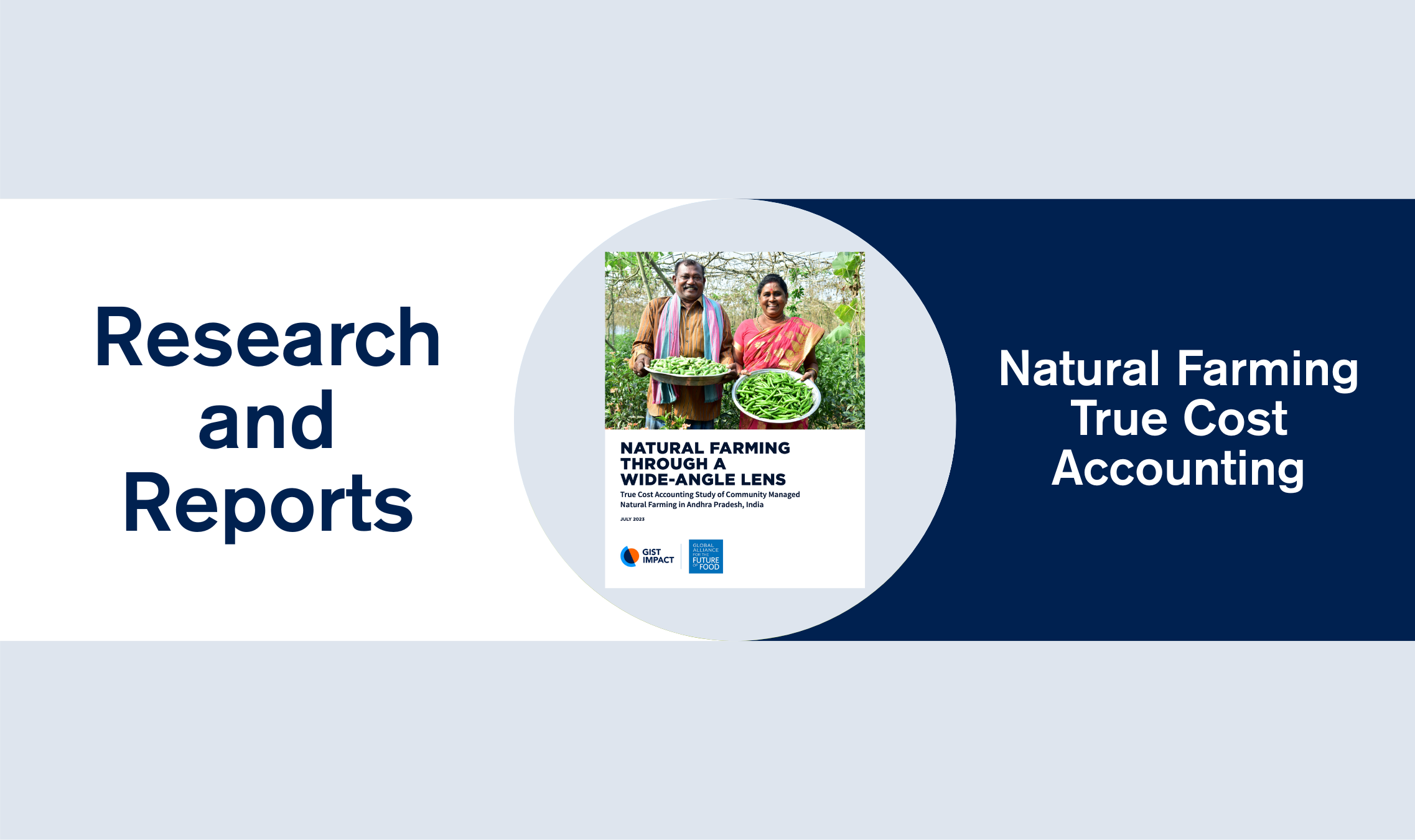New Delhi, 19 July 2023 – A pioneering new study analysing the costs and benefits of different farming systems gives new evidence to support agroecological natural farming as a key approach to help feed communities and transition farmers to nature-positive outcomes in support of the Sustainable Development Goals (SDGs).
This first-of-its-kind research, led by impact data and analytics provider GIST Impact and supported by the Global Alliance for the Future of Food, used True Cost Accounting methods to compare the major economic, social, and health impacts of natural farming with the three existing and still dominant farming systems in the Indian State of Andhra Pradesh – tribal farming, rainfed dryland agriculture, and chemically-intensive farming in the delta region.
The report, “Natural Farming Through a Wide-Angle Lens: True Cost Accounting Study of Community Managed Natural Farming in Andhra Pradesh, India,” shows that farms using natural inputs achieved equal or higher yields compared to the other farming systems – on average, these farms saw an 11% increase in yields – while maintaining higher crop diversity. This effectively refutes the idea that chemically-intensive farming methods are necessary to meet the food production demands of a growing population.
As a result of lower input costs and higher incomes, community-managed natural farming in Andhra Pradesh (APCNF) also improved farmer livelihoods, with net incomes averaging 49% higher. Furthermore, it led to better health outcomes and stronger communities. Villages with a higher takeup of natural farming also had higher female workforce participation.
The results highlight the positive return on public investment resulting from natural farming, with strong evidence that natural farming offers a better alternative to the existing farming systems.
“Given the ongoing climate impacts, it is imperative to scale inclusive and climate-resilient agricultural models,” said Pavan Sukhdev, CEO of GIST Impact and project director. “By using a True Cost Accounting framework, policymakers can now assess the costs and benefits of different farming systems, considering economic, social, environmental and human health factors that were previously overlooked in conventional metrics focused solely on yields and profits.”
“Our research provides a blueprint for environmentally-friendly agricultural development that supports social and economic goals while mitigating climate and biodiversity challenges,” said Sukhdev.
The study also highlights the social impacts of natural farming. A virtuous cycle of increased economic gains, trust, cohesion, and reciprocity was observed, with women playing a significant role in enhancing social capital. Smaller farms and those practicing natural farming exhibited higher social capital scores, emphasising the importance of smallholder farmers in community development.
Additionally, those practicing natural farming experienced fewer on-farm health risks, losing 33% fewer working days to illness compared to farmers using other methods. The use of chemical pesticides and fertilizers in other practices correlated with higher health costs and productivity losses, further underscoring the benefits of natural farming on human health.
The research was possible thanks to the work of Andhra Pradesh Community-Managed Natural Farming (APCNF) – a state-wide agroecological transformation of the farming practices of its 6 million farmers over 6 million hectares and 50 million consumers. It is the largest transition to agroecology in the world, with 630,000 farmers addressing multiple development challenges: rural livelihoods, access to nutritious food, biodiversity loss, climate change, water scarcity and pollution.
For the study, a comprehensive primary household survey was conducted between 2020 and 2022 in twelve selected villages across three different agro-ecological regions of Andhra Pradesh, encompassing a diverse range of farming households.
“This study is a significant step forward, bringing together science and economics to deliver objective analysis and enhance our understanding of different agricultural systems. It confirms what we can see in the villages: that community-managed natural farming supports community cohesion in villages, improves farmers’ health outcomes and increases their income – especially for women,” said Vijay Kumar Thallam, Executive Vice Chairman, RySS – Andhra Pradesh Community-Managed Natural Farming (APCNF).
“As the world grapples with the urgent need for food systems transformation, this groundbreaking research provides valuable insights for policymakers, communities, and farmers worldwide. By embracing agroecological practices like natural farming and employing frameworks like True Cost Accounting, we can transition to resilient, productive food systems at scale while promoting social and economic well-being and at the same time, reducing public expenditures,” said Lauren Baker, Deputy Director, Global Alliance for the Future of Food.
Media Contacts:
About GIST Impact
GIST Impact is a leading impact data and analytics provider that has been measuring and quantifying corporate impacts for more than 15 years. GIST Impact’s historic and deep expertise in the economics of ecosystems and biodiversity (TEEB) enriches its clients’ knowledge of their impacts and dependencies on nature.
With a team of 100+ scientists, engineers, data scientists and ecological and environmental economists, GIST Impact codifies this experience within its market-leading impact platforms and datasets, covering 12,800+ companies with geographically precise, time-series data.
GIST Impact works with pioneering companies across all sectors and with investors representing over $8 trillion in assets under management. GIST Impact also partners with some of the world’s largest ESG data providers, business networks, and fintech platforms to enable impact measurement across global markets.
About the Global Alliance for the Future of Food
The Global Alliance for the Future of Food is a strategic alliance of philanthropic foundations working together and with others to transform global food systems now and for future generations. We believe in the urgency of transforming global food systems, and in the power of working together and with others to effect positive change. Food systems reform requires that we craft new and better solutions at all scales through a systems-level approach and deep collaboration among philanthropy, researchers, grassroots movements, the private sector, farmers and food systems workers, Indigenous Peoples, government, and policymakers.
About Andhra Pradesh Community Managed Natural Farming (APCNF)
Rythu Sadhikara Samstha (RySS), a Government of Andhra Pradesh Section 8 company is implementing the Andhra Pradesh Community Managed Natural Farming programme. APCNF is working towards transitioning from conventional farming to nature-based solutions ingrained with community wisdom and agroecological principles through natural farming.
With 630,000 farmers enrolled to date in 3730 villages across the state, the programme credits the social movement of women self-help groups and their federations are leading the transformation.





